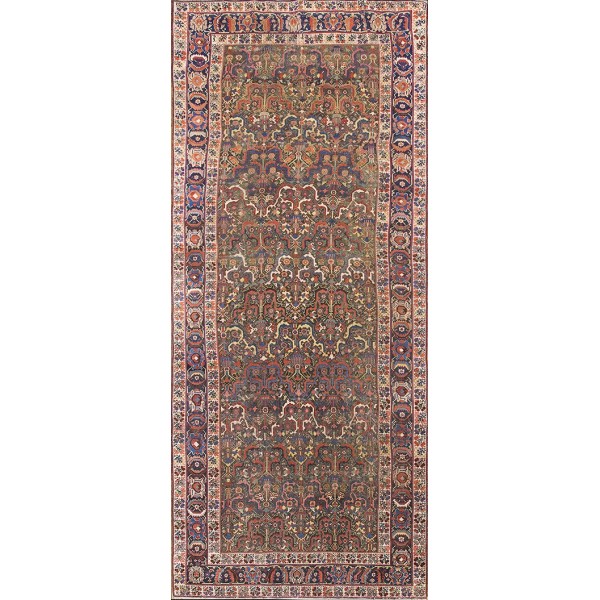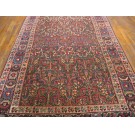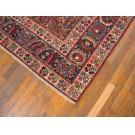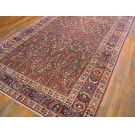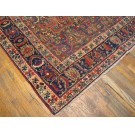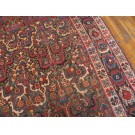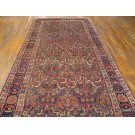Late 18th Century N.W. Persian Gallery Carpet
Northwest Persian Gallery Carpet
Probably Kurdistan, Possibly Kolyai
3rd quarter 18th Century
This antique gallery format carpet is a particularly fine example of a select group of Kurdish carpets accurately interpreting a 17th century Mughal Indian Agra prototype.
The abashed and slightly corroded brown field displays a complex, dense allover one-way pattern of three blossom flowers, small palmettes and geometric rosettes connected by fractional split arabesques and broken vertical staves.
Although the pattern seems to be textile-derived, in fact there are surviving
Indian pile carpets with a virtually identical pattern. Most salient are the split
arabesques in ivory, yellow, red and royal blue which delineate a quasi-lattice
pattern. The field is densely covered and there are no open areas. The pattern is balanced in all directions, a sign of a skilled workshop.
The main navy border displays two types of palmettes, rosettes and embracing
pairs of lancet leaves, with matching ivory minor stripes of repeating, discrete
squares of trefoiled double flowers. These flowers appear exactly on contemporary Kirshehir Turkish rugs and later in the 19th century on Luri tribal
rugs.
The weave employs symmetric (Turkish) knots on a mixed foundation of cotton
warps and single wool wefts between knot rows.
This structure is common in Kolyai Kurdish carpets of the period. The kelleh
format is also a Kolyai specialty. A small number of these carpets are known,
often with burgundy fields. Ours is unusual for its brown ground. All share the
same design. How a classic Indian carpet got to Kurdistan to copy is one of the
many unsolved rug mysteries. Add in the Turkish style minor borders and one
has a doubly curious, but highly attractive and totally authentic carpet. A few
pieces in related patterns have been assigned to Malayer to the east on the basis of weave character, but they are of the same age. A date for our piece at the 3rd quarter of the 18th century is quite acceptable.
| Stock ID: | #20419 |
| General Rug Type: | Persian Informal |
| Specific Rug Type: | N.W. Persian |
| Circa: | 1750 |
| Ground Color: | Tobacco |
| Border Color: | Ivory |
| Origin: | Persia |
| Material: | Wool |
| Weave: | Pile - Knotted |
| Shape: | Rectangle |
| Width: | 6' 4" ( 193 cm ) |
| Length: | 15' 8" ( 478 cm ) |
| Tearsheet Download |
